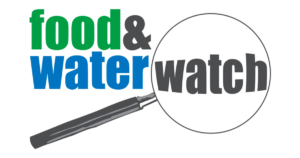

The declaration by Scott Pruitt, who now leads the federal Environmental Protection Agency (E.P.A.), of a new day, and a new future for the agency, worries Americans concerned about the rollback of policies aimed at protecting the environment as well as health-protective rules. The rollback has happened fast: as of early 2018, 67 environmental rules are on the way out under Trump according to a report in the NY Times (updated as of 1/31/18). And in the succinct words of an editorial in the NY Times, Alone and Adrift in a Warming World: The hacks, industry careerists and global warming deniers [Trump] has appointed to run agencies responsible for climate policy are mostly a joke.
In light of the demoralizing developments at the E.P.A. and the rejection of a scientific approach to addressing global warming, this ray of hope deserves special attention: The national advocacy group, Food & Water Watch, and the non-profit legal advocacy organization, Public Justice, have announced that steps have been taken to commence a Citizen Lawsuit under statutory provisions of the Resource Conservation and Recovery Act, a law designed to give citizens in the vicinity of toxic facilities a means of redress when their health or safety is damaged or at risk.
Residents of Delaware’s Indian River Bay area and Food & Water Watch (also a plaintiff) have taken the first step in maintaining a Citizen Lawsuit by providing notice to the E.P.A., the state of Delaware and most important to Mountaire Corporation (which operates a massive Hillsboro, Delaware chicken processing facility in the Indian River Bay area) that they intend to sue following Mountaire’s refusal to take adequate actions to stop contamination of local water supplies and residential wells. The chicken processing facility produces 2.4 million gallons of waste each day comprised of manure, feathers, carcasses, organs, blood, dirt and wastewater which is stored in lagoons and then the liquid part of the waste is sprayed onto nearby disposal fields.
Under the Resource Conservation and Recovery Act, a court may award costs of litigation (including reasonable attorney and expert witness fees) to the substantially prevailing party. Hats off to the two advocacy groups, Food & Water Watch and Public Justice for spotlighting citizens taking action for themselves given the worrisome changes at the E.P.A. One plaintiff, Gina Burton, who lives across a cornfield from the Mountaire facility, noted that her family’s land is the reason they could build this huge facility and that her family has suffered horrible health in recent years.
The groundwater aquifer below the Mountaire facility is the sole source of drinking water for the surrounding community. Groundwater monitoring has shown serious contamination of the water supply since at least 2000. A number of wells adjacent to the industrial chicken processing plant have routinely tested for nitrate contamination of 10 mg/l and above (levels deemed unsafe by state regulators). These levels of contamination according to the plaintiffs, have been proven to increase the risk of serious health risks, including some forms of cancer and autoimmune system dysfunction.
If Mountaire does not adequately address the concerns noted in the notice, the chicken processing facility will be subject to a lawsuit alleging that Mountaire is operating an open dump in violation of the prohibitions of the Resource Conservation and Recovery Act. The Delaware law firm of Jacobs & Crumplar, and Chris Nidel, a Washington D.C.-based environmental attorney at Nidel & Nace, PLLC as well as Jessica Culpepper, a staff attorney at Public Justice are representing the plaintiffs. Attorney Thomas Crumplar emphasized that Safe drinking water is not a privilege of a select few but is a basic right for all, and attorney Chris Nidel noted that No one should be forced to bathe in bottled water because they worry about the safety of their pregnancy.
(Frank W. Barrie, 3/30/18)





